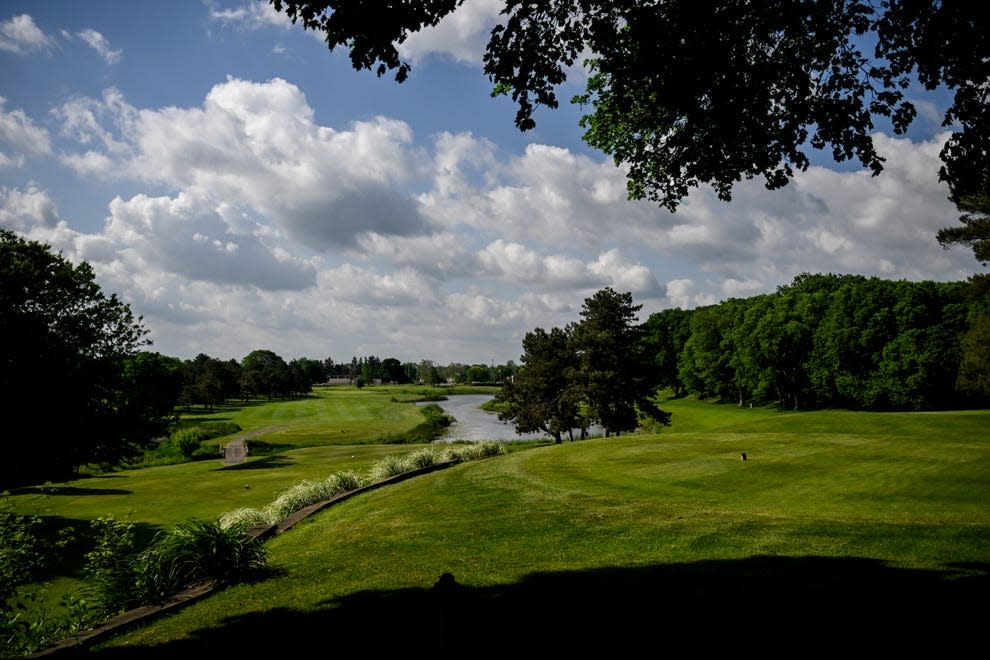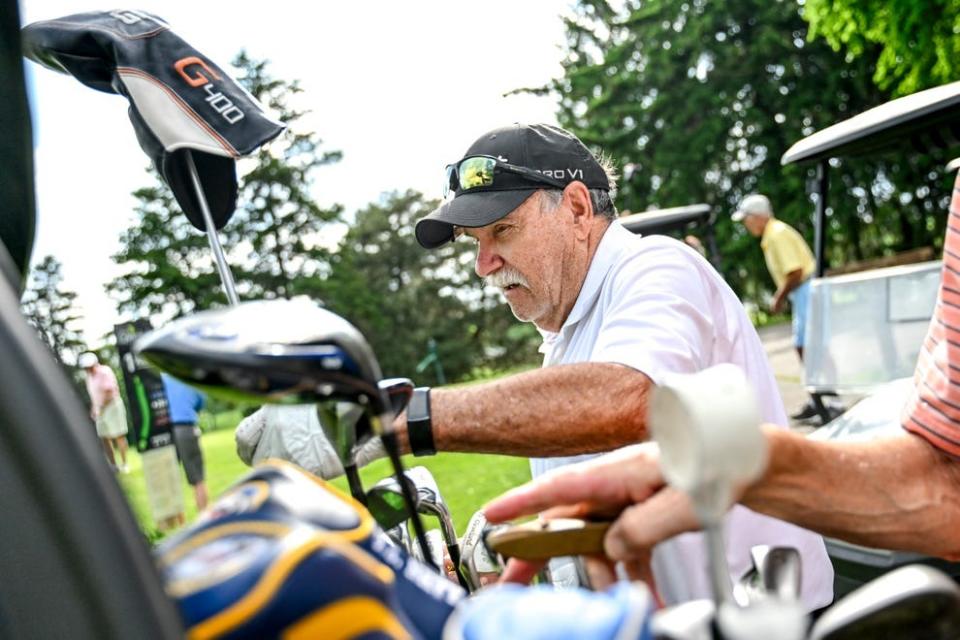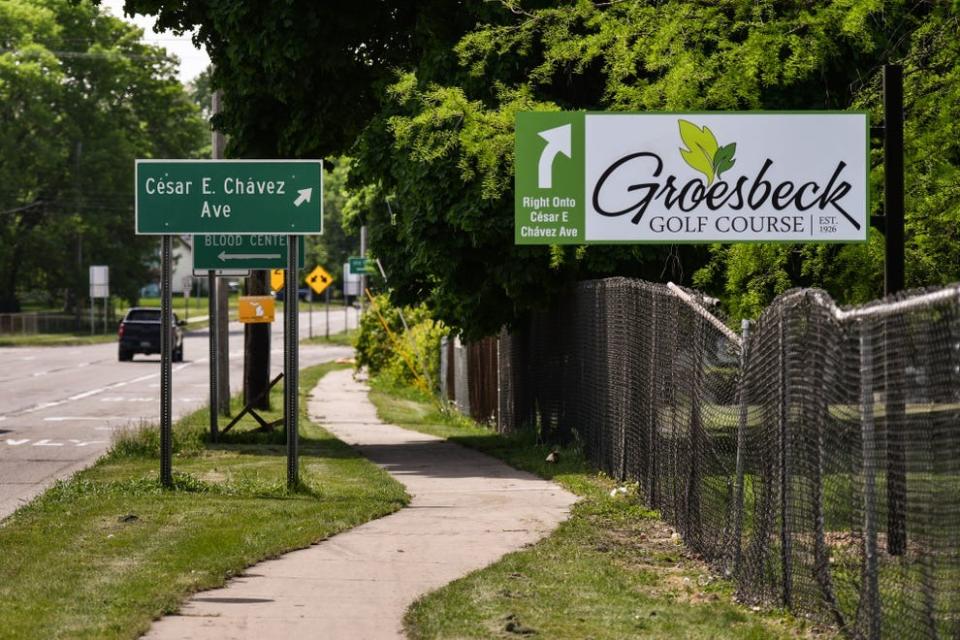When a Michigan city proposed selling its last municipal golf course, residents immediately cried foul

LANSING, Mich. — When Lansing City Councilmember Peter Spadafore proposed selling Groesbeck Golf Course last month, his suggestion shook local residents and golfers like a warning shout of “fore.”
Spadafore and his fellow council members ultimately decided it was too soon for such a decision on the city’s original, and last remaining, public golf course, just two years shy of its 100th birthday in 2026.
The mere mention of a sale, however, rattled those who have grown up golfing on what once were four municipal golf courses in Lansing.
“Everybody is amazed this place exists, tucked here in the middle of the city,” said Debbi Kile, who recently golfed at Groesbeck, 1513 E. Caesar E. Chavez Ave. “It’s just beautiful. This is a gem, and I don’t know how they couldn’t make money with this.”
Paul Albanese, a golf course designer who spoke to the State Journal in 2016 when his firm was designing a refresh of several holes at Groesbeck, praised it as a fantastic course, rooted in the Scottish traditions of working with the natural territory.
The public course, cheaper than most other options in the region at $29 for 18 holes during the week, is affordable for groups like Paul Hartley’s, who was with about 10 men playing at Groesbeck in late May.
“It’s the young people and the retirees that play here,” Hartley said. “The people who are working age, they can afford the Eagle Eye and the other expensive courses. But the young and old, that’s who this kind of course is for.”
Municipal courses on the rise
Lansing, facing a budget crunch following the Great Recession in 2008, jettisoned most of its golf courses. Then-mayor Virg Bernero said at the time that the sales were necessary to save the city’s flagging finances.
The nine-hole Sycamore golf course had closed in 2001, and in 2003 it was converted to a driving range, spurred in part by a $3.5 million loss in the previous decade across all four golf courses. A beginners program, First Tee, was launched at the property and later closed.
The Waverly and Red Cedar golf courses closed in 2007. Voters authorized the sale of the courses in a 2012 vote, although Waverly and Red Cedar weren’t officially sold to developers until 2018.
National trends could be in Groesbeck’s favor, according to the National Golf Foundation.
“There’s been a net gain of more than 140 (municipal) courses since 2004, amidst a backdrop of a market correction that’s contributed to a 13% decline in U.S. golf supply over a 20-year span,” the federation said in March. “The increase is in contrast with the broader reductions and the public/publicized challenges municipal golf encounters in some areas.
The 2,939 municipal golf courses operating in the U.S. – about 18% of all courses – is an all-time high, the federation noted.
Erik Matuszewski, editorial director for the National Golf Foundation, said Michigan has more public golf courses, 742, than any other state, and noted there have never been more municipal golf courses than today.
He acknowledged, however, that many older municipal courses face competition to make costly upgrades and if the land is valuable, it can draw developers’ eyes.

Mac MacEachran gets his club out of the bag before teeing off at Groesbeck Golf Course on Wednesday, May 22, 2024, in Lansing (Photo: Nick King/Lansing State Journal)
Groesbeck use doubles since 2017
The city, in 2018, turned Groesbeck’s operation over to the nonprofit Lansing Entertainment and Public Facilities Authority, which also operates Jackson Field, where the Lansing Lugnuts play, and the Lansing Center.
The number of rounds played has increased dramatically since, from 14,702 rounds in 2017 to 32,791 in 2021. Subsequent years have seen some falloff but 31,646 rounds were played in 2023.
But the golf course hasn’t made a profit since 2022, when it netted $50,000 before accounting for the city’s annual subsidy.
LEPFA interim President and CEO Tristan Wright declined to comment for this story.
FY2021 | FY2022 | FY2023 | |
Operating revenue | $871,254 | $861,130 | $938,997 |
Operating expense | $755,461 | $810,528 | $1,100,200 |
City contribution | $85,000 | $85,000 | $96,000 |
Operating income | $115,793 | $50,602 | -$161,203 |
Groesbeck Golf Course financials, representing audited years, as provided by LEPFA
Groesbeck receives the bulk of its funding from greens fees, equipment rental and concessions.
It has an annual budget of about $1.1 million. Groesbeck’s subsidy from the city was $207,550 in 2018, when LEPFA took control. The subsidy has since dropped to less than $100,000 each year.
In the budget the City Council approved on May 20, the subsidy for Groesbeck was $78,000, down from $96,000 in the 2023-24 budget.
Groesbeck ended 2023 with $682,000 in the bank, according to LEPFA financial documents.
Major improvements needed
The 1972 All-City High School Golf Championship winners from Sexton High School, including Burton Smith, who remembers playing at Groesbeck Golf Course.
Burton Smith said he and his Sexton High School teammates unseated East Lansing’s three-year city championship run in 1972 at Groesbeck, which, with 18 holes, was often the home of many of the biggest golf games and tournaments.
Smith said he remembers golfing at all four city courses.
Despite council members’ reassurances that Groesbeck’s immediate future is secure, LEPFA officials spent the most recent budget negotiations emphasizing the Groesbeck’s challenges.
The golf course has two big needs, Wright told city council members in May.
She said the course needs to upgrade from an outdated hydraulic irrigation system to an electric version. Course officials said an estimate from Thielen, a turf company in Mt. Pleasant, a year ago put the cost at $427,500.
The course also needs to upgrade its golf cart barn to fit more carts, at an estimated cost of $80,000 or more.
Groesbeck has had at least $64,000 in upgrades and fixes in recent years, including $28,000 to fix clubhouse steps, a $10,000 pump house repair, new clubhouse furniture for $8,000 and upgraded carts for $7,000, according to a list LEPFA provided of recent work.

Sally Hudgins, left, talks with golfing partner Stephanie Adkins while playing a round at Groesbeck Golf Course on Wednesday, May 22, 2024, in Lansing. (Photo: Nick King/Lansing State Journal)
Groesbeck spurs memories of ‘Those were the days!’
Kevin Rule grew up playing at Lansing’s now-sold-off golf courses and can’t help but worry. He fears any talk about selling Groesbeck is the first step to following through on the swing.
Rule suspects that, eventually, time will catch up with the city’s lone golf course and it will also be sold to developers.
“But for now,” he said, “it’s cool to see Groesbeck still around and retooling themselves.”
Mac MacEachran watches his ball after teeing off at Groesbeck Golf Course on Wednesday, May 22, 2024, in Lansing
Rick Banker agrees. Growing up playing golf in the Lansing area in the 1960s was a dream, said Banker, who now splits his time between Marquette and Arizona, playing as much golf as he can squeeze in.
He started, like most other kids, with Sycamore. It was the quickest and cheapest option, favored by kids who would work their way up to the more challenging Waverly and Red Cedar courses before finally graduating to the 18-hole Groesbeck, generally when they joined the high school golf teams, Banker said.
They’d grab two or three clubs, do some golfing and spend the rest of the day fishing golf balls out of the rivers to sell or knock around themselves.
“We would go to Sycamore … I was talking the other day to a buddy who went to Walter French with me,” Banker said, “We’d call it a 50-cent day; 35 cents if you were under 16 to play nine holes, 10 cents for a pop and 5 cents for a Snickers. Those were the days!”
Mixed success selling to developers
This is the outdoor space in front of Old Bag of Nails in the Red Cedar Development facing north into Frandor Saturday, July 22, 2023. The Lansing City Council is considering designating the Red Cedar Development complex an additional Social District.
Lansing has had mixed results thus far selling golf courses to developers.
The Red Cedar golf course property was purchased by Lansing developer Joel Ferguson and Frank Kass of Columbus, Ohio, for $2.2 million in 2018. Ferguson, co-founder of Ferguson Development, touted the eventual project on about 35 acres as bridging the gap between Michigan State University’s campus and Lansing. Parts of the old golf course remain city property as wetlands that weren’t developable.
Construction began at the Red Cedar development in 2019 and was finished in 2023. The development cost more than $250 million and is considered one of the largest single investments in the region in decades. It is home to a large senior housing facility, luxury lofts, a teashop, bookstore and a restaurant along with real estate offices and more.
Rule, one of the thousands of golfers who cut their childhood teeth on Lansing’s smaller courses, realized this month that he had just been eating at a restaurant patio where he used to play golf.
“I was walking my friends through Red Cedar, where we were eating, it was probably at the edge of hole 1, I think,” he said.
Remembered most fondly as the long-shot golf course, the nine-hole Waverly course featured a hole stretching about 600 yards away from the tee.
Lansing sold the Waverly course, at the corner of West Saginaw Highway and North Waverly Road in Lansing Township, to Grand Rapids-based Northern Capital Investments LLC for $2.2 million. Development plans have been slow to unfold.
In 2022, developers said the site could be home to various types of housing, including senior, apartments and single-family homes, as well as restaurants or storage facilities, but they would not build retail space before getting tenants.
The property now has a car wash that opened in 2022. The rest remains largely green space.
Jay Barnes, the company’s vice president, declined to comment for this story.
Lansing Township Supervisor Maggie Sanders and Deputy Supervisor DeeAnn Overton also did not respond to requests for comment.
The former Sycamore course now houses the Fenner Nature Preschool and the city recently opened an 18-hole disc golf course there.

Signage outside of the City of Lansing’s Groesbeck Golf Course, seen Thursday, May 16, 2024. (Photo: Matthew Dae Smith/Lansing State Journal)
‘It changed my life’
The annual subsidies that go to Groesbeck have not always sat well with city council members.
Spadafore, who has fond memories of playing the course, said in May the frequent council criticism over the subsidies may be best settled by selling it.
It was largely seen as a tongue-in-cheek resolution, asking other council members to put up the votes to sell it or stop making the threats.
It may have worked. During a May 20 council committee meeting, Spadafore and his fellow council members Ryan Kost, Jeremy Garza and Adam Hussain each said they were committed to the city keeping the golf course.
But change may happen because of the golf course’s financial performance. Spadafore, Kost, Garza and Hussain have said they’re open to different management, and others are calling for improvements.
Lansing Mayor Andy Schor said the course has added amenities and worked to support itself through user fees while keeping the price affordable.
“It’s where so many young people in Lansing pick up their first golf club, try the sport, and make lasting memories,” he said.
A group of golfers begin play at Groesbeck Golf Course on Wednesday, May 22, 2024, in Lansing
Scott Bean, the mayor’s spokesman, responded to questions about the mayor’s stance on Groesbeck.
“Mayor Schor has no plans to market the Groesbeck Golf Course for sale,” he said. “No developers have reached out to the City because the course has not been put out for an RFP for sale or development.”
Jan Brintnall grew up participating in Greater Lansing Publinks golf programs, which gave children easier access to municipal courses.
Her father cut down a five iron so she could practice with a whiffle ball when she was only 5, and she is now an LPGA Life Member as well as a Michigan State University faculty member who teaches golf management courses.
“It changed my life, the opportunities that came from golf went to every aspect of my life,” she said. “Just about every friend I have in life, except my parents, came from golf. It’s the kind of sport that can save a life.”
Because the Groesbeck course is paid for and appears increasingly solvent, Brintnall said a few major changes, such as a driving range and banquet hall, could bring in significant new revenue streams.
A driving range could be considered, said Kost, a council member whose ward covers the golf course. He said there is Lansing Board of Water & Light property nearby that could be used as a driving range, although it may involve complicated liability and legal issues because the property may have some environmental concerns.
BWL spokesperson Amy Adamy said the property is planned to be the site of a new BWL green energy initiative.
Brintnall has more ideas for Groesbeck. She has been pushing FlingGolf, a variation played with a lacrosse-style stick on the same courses. Brintnall said it requires less expertise and can be a more accessible way to open the sport to more people as well as a new revenue stream.
“From a new golfer perspective, the nine holes are beneficial,” she said. “One of the complaints of golf is it takes too long and it costs too much, so if you don’t have nine-hole options, the loss really impedes participation levels.”
Contact Mike Ellis at mellis@lsj.com or 517-267-0415.

 Yahoo News
Yahoo News 
